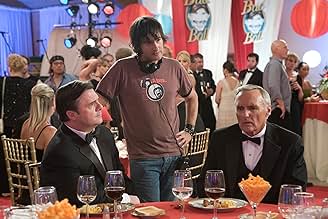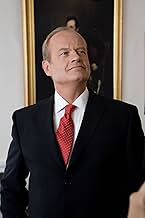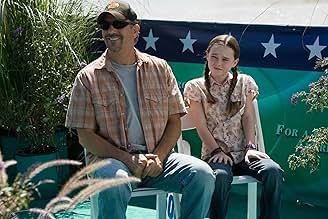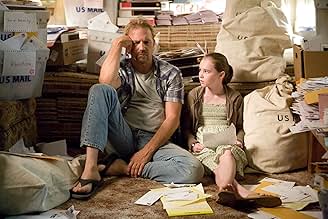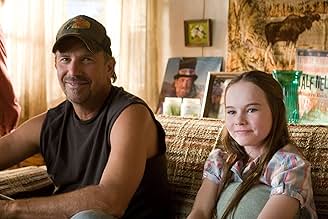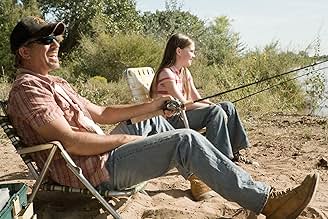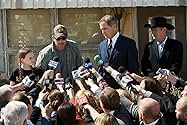AVALIAÇÃO DA IMDb
6,1/10
20 mil
SUA AVALIAÇÃO
Adicionar um enredo no seu idiomaIn a remarkable turn-of-events, the result of the presidential election comes down to one man's vote.In a remarkable turn-of-events, the result of the presidential election comes down to one man's vote.In a remarkable turn-of-events, the result of the presidential election comes down to one man's vote.
- Direção
- Roteiristas
- Artistas
- Prêmios
- 1 indicação no total
Charles Esten
- Lewis
- (as Charles 'Chip' Esten)
- Direção
- Roteiristas
- Elenco e equipe completos
- Produção, bilheteria e muito mais no IMDbPro
Avaliações em destaque
"Swing Vote" is a good movie. It could have been great, but it isn't, but it is still good. At its best, it invokes Frank Capra's classic films on politics, including "Meet John Doe" and "Mr. Smith Goes to Washington." It never reaches their level, though, and that failure to hit the top is a bit frustrating.
An older, dumpier, and shabbier Kevin Costner is the best part of the film. Costner is a star and that shows here. Even the grunge that is his costume in almost every scene can't disguise his charisma. Costner's voice has not aged and he uses it to great effect, especially in a final speech.
The film draws laughs by parodying our two major political parties, with a Democratic presidential candidate starring in the funniest anti-abortion TV commercial ever made (no doubt its competition was slim, but it is very funny) and a Republican presidential candidate touting his party's tender concern for the environment.
These excellent scenes make you wish that the movie had gone deeper. It doesn't, though. It veers off into dead-end soap opera subplots about Costner's daughter's boyfriend from school and her attempt to live with her estranged mother (Mare Winningham, in a role that should have ended up on the editing room floor, as it contributes nothing to the film.) The casting wasn't great. The two presidential candidates and their aids end up being cardboard cut-out stereotypes of Machiavellian evil (Stanley Tucci) and compromise (Nathan Lane). Kelsey Grammar and Dennis Hopper, as the candidates, never transcend their "Frasier" and "Easy Rider" personas. Other actors, perhaps unknowns, should have been cast in these two key roles.
Paula Patton, the woman who played what would have been the Barbara Stanwyck role in the Frank Capra movie, was pretty as a little doll and a complete bore. This is part of a pattern in today's Hollywood; female leads must have the perfectly perky looks of a plastic doll; there's no need for them to be talented. Male leads, like Costner, can be beat-up, and slovenly, but must be talented. Patton's role, that of the desperate, sharp, female reporter who gains inside knowledge of a national story, is underwritten, and she does nothing with it. It's a dead-end, and that's a shame. It makes me want to rewatch "Meet John Doe" in which Stanwyck worked so well as the female reporter.
Overall, though, this movie is better than much else at the multiplex, and it at least ventures into the world of ideas.
An older, dumpier, and shabbier Kevin Costner is the best part of the film. Costner is a star and that shows here. Even the grunge that is his costume in almost every scene can't disguise his charisma. Costner's voice has not aged and he uses it to great effect, especially in a final speech.
The film draws laughs by parodying our two major political parties, with a Democratic presidential candidate starring in the funniest anti-abortion TV commercial ever made (no doubt its competition was slim, but it is very funny) and a Republican presidential candidate touting his party's tender concern for the environment.
These excellent scenes make you wish that the movie had gone deeper. It doesn't, though. It veers off into dead-end soap opera subplots about Costner's daughter's boyfriend from school and her attempt to live with her estranged mother (Mare Winningham, in a role that should have ended up on the editing room floor, as it contributes nothing to the film.) The casting wasn't great. The two presidential candidates and their aids end up being cardboard cut-out stereotypes of Machiavellian evil (Stanley Tucci) and compromise (Nathan Lane). Kelsey Grammar and Dennis Hopper, as the candidates, never transcend their "Frasier" and "Easy Rider" personas. Other actors, perhaps unknowns, should have been cast in these two key roles.
Paula Patton, the woman who played what would have been the Barbara Stanwyck role in the Frank Capra movie, was pretty as a little doll and a complete bore. This is part of a pattern in today's Hollywood; female leads must have the perfectly perky looks of a plastic doll; there's no need for them to be talented. Male leads, like Costner, can be beat-up, and slovenly, but must be talented. Patton's role, that of the desperate, sharp, female reporter who gains inside knowledge of a national story, is underwritten, and she does nothing with it. It's a dead-end, and that's a shame. It makes me want to rewatch "Meet John Doe" in which Stanwyck worked so well as the female reporter.
Overall, though, this movie is better than much else at the multiplex, and it at least ventures into the world of ideas.
Kevin Costner was actually in another decent movie. His last movie I saw, Mr. Brooks, was pretty good also. I would call this movie a political satire, that tries to be a little funny at times. However, the idea that one guy determines the presidential election is absurd, but if you can get past that, then the plot is OK. It was funny how the movie had the political parties doing adds for things they oppose. Example, the democrats supporting pro life because Bud says he's pro life.
The plot is struggling, every day man, Bud Johnson, just got laid off. He has a very smart daughter and she cares about the presidential election. Bud promises to vote since Molly thinks it's important. But, when he doesn't show, Molly votes in his place but the power goes out and the vote didn't count. The election comes down to New Mexico and for some reason, not told in the movie, Bud's vote will decide the electoral votes. I mean, how could the votes be even for each side and even if they were very close, how many months would it take for all the recounts that would take place. But any way, it's up to Bud, whom doesn't care about politics. He becomes an instant celebrity and is courted by both candidates. By the end of the film, Bud grows an appreciation for the political scene and realizes that it is important to care about social issues.
FINAL VERDICT: Funnier than I thought and provides a message. Plus, the movie doesn't try to say that one party is better than the other.
The plot is struggling, every day man, Bud Johnson, just got laid off. He has a very smart daughter and she cares about the presidential election. Bud promises to vote since Molly thinks it's important. But, when he doesn't show, Molly votes in his place but the power goes out and the vote didn't count. The election comes down to New Mexico and for some reason, not told in the movie, Bud's vote will decide the electoral votes. I mean, how could the votes be even for each side and even if they were very close, how many months would it take for all the recounts that would take place. But any way, it's up to Bud, whom doesn't care about politics. He becomes an instant celebrity and is courted by both candidates. By the end of the film, Bud grows an appreciation for the political scene and realizes that it is important to care about social issues.
FINAL VERDICT: Funnier than I thought and provides a message. Plus, the movie doesn't try to say that one party is better than the other.
I expected little after the lukewarm critical response. The film is not a scathing satire of right-wing hypocrisy. But it is inspired. And rare for this genre, balanced. It's target is voter complacency and the winning-is-everything bloodsport of the presidential race. Believe it or not the film makes a good case for voting as a moral choice, a choice we should take seriously. Not the stuff of Hollywood hilarity for sure. Yet it is well-acted, charming and original. Hard to guess where the story is going. Great laughs are better for being unexpected.
Liberal-leaning viewers and critics may have been disappointed based on a trailer showing Dennis Hopper as a rapid pro-life candidate. The story here is about voters. And how far our major political parties are willing to go to court the swing vote. The genius of this film is that it takes targeted campaigning to its logical conclusion. This is the stuff professional persuaders are more and more paid to do.
Not perfectly executed, but an inspired premise with better than expected follow-though. A treat. So glad I went.
P.S. full disclosure, I am a very liberal Democrat.
Liberal-leaning viewers and critics may have been disappointed based on a trailer showing Dennis Hopper as a rapid pro-life candidate. The story here is about voters. And how far our major political parties are willing to go to court the swing vote. The genius of this film is that it takes targeted campaigning to its logical conclusion. This is the stuff professional persuaders are more and more paid to do.
Not perfectly executed, but an inspired premise with better than expected follow-though. A treat. So glad I went.
P.S. full disclosure, I am a very liberal Democrat.
I'm going to go ahead and assume that it's not an easy task to make a crowd-pleasing movie centered on politics that goes to such strenuous efforts to be non-partisan and maybe chalk up my dissatisfaction with the movie to that. Then again, it might also have something to do with a critical decision that they made in how to end the movie, which is sure to make every single solitary person who watches it throw up their arms in disgust.
But the movie is not about who wins the presidency, it's about the pure chaos of the American political system and its millions of weaknesses and faults. Sure, the premise of a presidential election coming down to a single vote is as preposterous as they come, but man if this movie doesn't get you thinking critically about the electoral process then it's safe to assume that probably nothing ever will.
Kevin Costner plays Bud, an American nobody from New Mexico who has never done anything with his life except have a daughter with a delusional drug addict who thinks she has a big singing career in her near future. He works as an egg inspector at an egg packaging plant, and he and his co-workers mourn the loss of their friends' (and soon, their own) jobs to "insourcing," the process of bringing Mexicans in to take their jobs rather than ship the factory and all those egg-laying chickens to Mexico.
Bud staggers through life in a drunken daze most of the time, routinely letting down his daughter Molly (Madeline Carroll), who raises him like a child. She gets him out of bed in the morning, criticizes his laziness and irresponsibility, reminds him to vote because it's part of a school project that she has to do, and through sighs of exasperation attempts to keep him at least a little bit in line. And of course it's the only thing in life that she fails at. When Bud gets drunk rather than show up to vote, she manages to almost cast his vote herself due to the sleepy voting booth security of beautiful Texico, New Mexico, which Google Earth has just informed me is a real place. Population 1,065.
In a clever plot development, it turns out that Bud's vote didn't go completely through but it appeared that he was there, so he is given another opportunity to cast his vote. Not right away, mind you, even though he evidently already tried to vote and thus probably had his mind made up. No, he is given ten days before he has to vote, thus providing plenty of time for a movie to happen.
Young Madeline Carroll steals most of the scenes that she's in as Bud's daughter, so it's interesting that her character is one of the biggest weak points in the movie, the other one being her dad. Bud is supposed to be a typical American, but I just saw a drifting drunk who never did anything with his life and never would have had he not been forced to. It's true that the vast majority of Americans live lives that are closer to Bud's than President Boone's (Kelsey Grammar), but does he have to be a TOTAL loser? How about just making him be a likable, regular guy? Like the guy he played in Field of Dreams? When I imagine the average American, I imagine something like Ray Kinsella. Although maybe with a slightly smaller house and less whispering from the sky.
The other problem is that the screenwriters overshot the character of Molly by about 160 IQ points. So much for the average American, right? This girl writes a school essay that doesn't merit a special award from the principal to show her dad, it grants her NATIONAL TELEVISED RECOGNITION. But to be honest, I had more of a problem with the fact that not only does she wake her deadbeat dad up in the morning so he could take her to school, she also treks to the bar and, finding him passed out in his truck when he should have been voting, she pushes him over and then drives him home herself. She's about 11 years old.
But where the movie succeeds is as a scathing revelation about certain realities of the American electoral process, such as the electoral college, which simplifies the vote-counting process even while massively distorting the actual numbers of who voted for who. The whole movie is about how one man's vote really does matter, but it leaves you with the feeling that you are supposed to forget that once he votes, every single vote in his state for the other candidate WON'T matter anymore, because they'll be switched to the other candidate. Isn't it interesting how that works? Can't we just count every single vote and award each candidate one huge number of individual votes? Seems a little more accurate to me.
Anyway, I do appreciate the way the movie highlights the fact that both sides, Republican and Democrat, are equally willing to stoop to any level and do absolutely whatever it takes to win, and that no one is above hitting below the belt and making hugely unethical decisions. There is a lot that needs to be changed in American politics, and even while clearly being based on the Election of 2000, one of the most controversial in American history, it calls those things to attention without ever even hinting that either side is right or wrong. The movie insists that America is the greatest country in the world but that in some ways, we're doing it all wrong, but the fact that a movie like this has the freedom to get made proves that even though we haven't reached a level of pure cohesive harmony, underneath all of our imperfections is a clear desire to get there.
But the movie is not about who wins the presidency, it's about the pure chaos of the American political system and its millions of weaknesses and faults. Sure, the premise of a presidential election coming down to a single vote is as preposterous as they come, but man if this movie doesn't get you thinking critically about the electoral process then it's safe to assume that probably nothing ever will.
Kevin Costner plays Bud, an American nobody from New Mexico who has never done anything with his life except have a daughter with a delusional drug addict who thinks she has a big singing career in her near future. He works as an egg inspector at an egg packaging plant, and he and his co-workers mourn the loss of their friends' (and soon, their own) jobs to "insourcing," the process of bringing Mexicans in to take their jobs rather than ship the factory and all those egg-laying chickens to Mexico.
Bud staggers through life in a drunken daze most of the time, routinely letting down his daughter Molly (Madeline Carroll), who raises him like a child. She gets him out of bed in the morning, criticizes his laziness and irresponsibility, reminds him to vote because it's part of a school project that she has to do, and through sighs of exasperation attempts to keep him at least a little bit in line. And of course it's the only thing in life that she fails at. When Bud gets drunk rather than show up to vote, she manages to almost cast his vote herself due to the sleepy voting booth security of beautiful Texico, New Mexico, which Google Earth has just informed me is a real place. Population 1,065.
In a clever plot development, it turns out that Bud's vote didn't go completely through but it appeared that he was there, so he is given another opportunity to cast his vote. Not right away, mind you, even though he evidently already tried to vote and thus probably had his mind made up. No, he is given ten days before he has to vote, thus providing plenty of time for a movie to happen.
Young Madeline Carroll steals most of the scenes that she's in as Bud's daughter, so it's interesting that her character is one of the biggest weak points in the movie, the other one being her dad. Bud is supposed to be a typical American, but I just saw a drifting drunk who never did anything with his life and never would have had he not been forced to. It's true that the vast majority of Americans live lives that are closer to Bud's than President Boone's (Kelsey Grammar), but does he have to be a TOTAL loser? How about just making him be a likable, regular guy? Like the guy he played in Field of Dreams? When I imagine the average American, I imagine something like Ray Kinsella. Although maybe with a slightly smaller house and less whispering from the sky.
The other problem is that the screenwriters overshot the character of Molly by about 160 IQ points. So much for the average American, right? This girl writes a school essay that doesn't merit a special award from the principal to show her dad, it grants her NATIONAL TELEVISED RECOGNITION. But to be honest, I had more of a problem with the fact that not only does she wake her deadbeat dad up in the morning so he could take her to school, she also treks to the bar and, finding him passed out in his truck when he should have been voting, she pushes him over and then drives him home herself. She's about 11 years old.
But where the movie succeeds is as a scathing revelation about certain realities of the American electoral process, such as the electoral college, which simplifies the vote-counting process even while massively distorting the actual numbers of who voted for who. The whole movie is about how one man's vote really does matter, but it leaves you with the feeling that you are supposed to forget that once he votes, every single vote in his state for the other candidate WON'T matter anymore, because they'll be switched to the other candidate. Isn't it interesting how that works? Can't we just count every single vote and award each candidate one huge number of individual votes? Seems a little more accurate to me.
Anyway, I do appreciate the way the movie highlights the fact that both sides, Republican and Democrat, are equally willing to stoop to any level and do absolutely whatever it takes to win, and that no one is above hitting below the belt and making hugely unethical decisions. There is a lot that needs to be changed in American politics, and even while clearly being based on the Election of 2000, one of the most controversial in American history, it calls those things to attention without ever even hinting that either side is right or wrong. The movie insists that America is the greatest country in the world but that in some ways, we're doing it all wrong, but the fact that a movie like this has the freedom to get made proves that even though we haven't reached a level of pure cohesive harmony, underneath all of our imperfections is a clear desire to get there.
Kevin Costner is adorable as the slacker father of a overachieving, 12-year-old daughter. The kid-as-parent/parent-as-kid premise wouldn't have worked nearly as well if Costner's character, Bud Johnson, weren't so darn lovable. If you're looking for perfectly coiffed, cleaned up Costner, you won't find him here. He mostly looks like your husband first thing in the morning -- you know, the scruffy hair, unshaven face, and glazed over, half-asleep look where you wonder what you ever saw in him? But inside is a heart of gold? He pulls this role off to perfection. He's the lovable underachiever always with a clueless grin.
When the attorney general shows up at his door to tell him basically that he has the deciding vote, Bud's only comment, in a half-whisper is, "Does this mean I'm going to have to do jury duty?" The movie is good -- in fact if you like Dave with Kevin Kline, you'll like Swing Vote.
However, it tried to combine two movies. One was the comedy with Bud being the ONLY voting demographic needing to be catered to -- hence, personal appearances by Richard Petty and Willie Nelson -- the other was a sometimes hard-to-watch story of a daughter, played by Madeline Carroll, caring for her alcoholic father.
Carroll is a wonderful actress, and would be stellar in a drama. Her wistful, knowing looks at her father's helplessness, and her astute understanding of her mother's inability to be a mother were heart-wrenching. That could have been an entire story in itself and often took away from the comic elements. Mare Winningham was fantastic as the mother who ran away. She, Costner and Carroll really clicked on screen in their one scene together as a family torn apart by the selfish indulgence of the parents to the detriment of the child who deserves more. I marveled at that scene until I remembered that Winningham and Costner were in the movie "The War" as parents torn apart by Vietnam to the detriment of their son, young Elijah Wood. Costner and Winningham should get together again in a more upbeat film. Their relationship is very natural.
But in spite of the sad, child-having-to-be-the-adult part of Swing Vote, it was 80% comedy, and Costner's antics made it laugh out loud funny at times. It didn't seem to be politically bent one way or the other. It was patriotic and commented on immigrants from Mexico taking away jobs from Americans. But it was also pro-environment and touched on lack of health care for the many. The end was pure feel-good. Everyone changed appropriately, realizing the true (Hollywood) meaning of voting in America.
When the attorney general shows up at his door to tell him basically that he has the deciding vote, Bud's only comment, in a half-whisper is, "Does this mean I'm going to have to do jury duty?" The movie is good -- in fact if you like Dave with Kevin Kline, you'll like Swing Vote.
However, it tried to combine two movies. One was the comedy with Bud being the ONLY voting demographic needing to be catered to -- hence, personal appearances by Richard Petty and Willie Nelson -- the other was a sometimes hard-to-watch story of a daughter, played by Madeline Carroll, caring for her alcoholic father.
Carroll is a wonderful actress, and would be stellar in a drama. Her wistful, knowing looks at her father's helplessness, and her astute understanding of her mother's inability to be a mother were heart-wrenching. That could have been an entire story in itself and often took away from the comic elements. Mare Winningham was fantastic as the mother who ran away. She, Costner and Carroll really clicked on screen in their one scene together as a family torn apart by the selfish indulgence of the parents to the detriment of the child who deserves more. I marveled at that scene until I remembered that Winningham and Costner were in the movie "The War" as parents torn apart by Vietnam to the detriment of their son, young Elijah Wood. Costner and Winningham should get together again in a more upbeat film. Their relationship is very natural.
But in spite of the sad, child-having-to-be-the-adult part of Swing Vote, it was 80% comedy, and Costner's antics made it laugh out loud funny at times. It didn't seem to be politically bent one way or the other. It was patriotic and commented on immigrants from Mexico taking away jobs from Americans. But it was also pro-environment and touched on lack of health care for the many. The end was pure feel-good. Everyone changed appropriately, realizing the true (Hollywood) meaning of voting in America.
Você sabia?
- CuriosidadesStanley Tucci's line "If you'd ever met my mother, you'd understand," was an ad-lib.
- Erros de gravaçãoAir Force One is never allowed to sit idle on a runway with the President on board.
- Citações
Molly Johnson: I want to live with Mom.
Bud Johnson: So do I.
- Cenas durante ou pós-créditos"and introducing Madeline Carroll"
- Trilhas sonorasCan't You See
Written by Toy Caldwell Jr. (as Toy Caldwell)
Performed by The Marshall Tucker Band
Courtesy of Shout Factory, LLC
By Arrangement with Natural Energy Lab
Principais escolhas
Faça login para avaliar e ver a lista de recomendações personalizadas
Detalhes
Bilheteria
- Orçamento
- US$ 21.000.000 (estimativa)
- Faturamento bruto nos EUA e Canadá
- US$ 16.289.867
- Fim de semana de estreia nos EUA e Canadá
- US$ 6.230.669
- 3 de ago. de 2008
- Faturamento bruto mundial
- US$ 17.635.397
- Tempo de duração
- 2 h(120 min)
- Cor
- Mixagem de som
- Proporção
- 2.35 : 1
Contribua para esta página
Sugerir uma alteração ou adicionar conteúdo ausente







